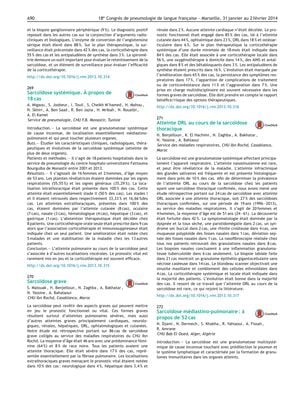Severe Sarcoidosis: A Retrospective Study of 86 Cases
January 2014
in “
Revue des Maladies Respiratoires
”

TLDR Severe sarcoidosis often requires long-term systemic corticosteroids and multidisciplinary care, with most patients improving but some experiencing persistent symptoms or complications.
The document discusses severe sarcoidosis, a systemic granulomatous disease of unknown cause, primarily affecting the lungs and potentially other organs. The study is retrospective, involving 86 cases of severe sarcoidosis at the respiratory diseases department of CHU Ibn Rochd. The average age of patients was 46 years, with a female predominance (64%) and 8% of black race. All patients had thoracic involvement, with severe cases (17%) mainly represented by pulmonary fibrosis. Life-threatening extrathoracic localizations were noted in 10% of cases, including neurological (4%), hepatic (3.4%), and renal (2%) involvement. No cardiac involvement was detected. The functional prognosis was compromised in 85% of cases, related to skin (44%), ophthalmic (23%), ENT (18%), and osteoarticular (6%) involvement. Systemic corticosteroid therapy, with a minimum duration of 18 months, was indicated in 84% of cases and was often effective. It was combined with local corticosteroids (56%), home oxygen therapy (14%), NSAIDs and analgesics (8%), and beta-blockers (3%). Antimalarial drugs were prescribed in 16% of cases. The evolution was marked by improvement in 65% of cases, persistence of respiratory symptoms in 17%, treatment complications or corticosteroid resistance in 11%, and worsening in 7%. Multidisciplinary management is often necessary in severe forms of sarcoidosis, considering the benefit/risk ratio of therapeutic options.





